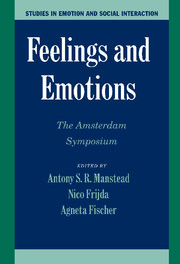Book contents
- Frontmatter
- Contents
- List of Contributors
- 1 Introduction
- PART I THE NATURE OF FEELINGS AND EMOTIONS
- PART II BASIC PSYCHOLOGICAL PROCESSES IN FEELINGS AND EMOTIONS
- 8 What We Become Emotional About
- 9 Feelings Integrate the Central Representation of Appraisal-driven Response Organization in Emotion
- 10 Emotions and Action
- 11 Basic Affects and the Instinctual Emotional Systems of the Brain
- 12 Exposure Effects
- 13 Feeling States in Emotion
- PART III FEELINGS AND EMOTIONS: THE PLACE OF PLEASURE
- PART IV FEELINGS AND EMOTIONS IN THEIR SOCIOCULTURAL CONTEXT
- PART V FEELINGS, EMOTIONS, AND MORALITY
- Subject Index
- Author Index
- Plate section
- References
11 - Basic Affects and the Instinctual Emotional Systems of the Brain
The Primordial Sources of Sadness, Joy, and Seeking
Published online by Cambridge University Press: 05 June 2012
- Frontmatter
- Contents
- List of Contributors
- 1 Introduction
- PART I THE NATURE OF FEELINGS AND EMOTIONS
- PART II BASIC PSYCHOLOGICAL PROCESSES IN FEELINGS AND EMOTIONS
- 8 What We Become Emotional About
- 9 Feelings Integrate the Central Representation of Appraisal-driven Response Organization in Emotion
- 10 Emotions and Action
- 11 Basic Affects and the Instinctual Emotional Systems of the Brain
- 12 Exposure Effects
- 13 Feeling States in Emotion
- PART III FEELINGS AND EMOTIONS: THE PLACE OF PLEASURE
- PART IV FEELINGS AND EMOTIONS IN THEIR SOCIOCULTURAL CONTEXT
- PART V FEELINGS, EMOTIONS, AND MORALITY
- Subject Index
- Author Index
- Plate section
- References
Summary
ABSTRACT
Primary-process affective processes emerge largely from subcortical action-perception brain systems that elaborate a variety of emotional-instinctual tendencies. This essay highlights how the nature of affect can be clarified by studying ancient brain operating systems that mediate separation distress, social play, and appetitive seeking in all mammals.
No knowledge would have been more valuable as a foundation for true psychological science than an approximate grasp of the common characteristics and possible distinctive features of the instincts. But in no region of psychology were we groping more in the dark.
– Freud, Beyond the Pleasure Principle (1920/1959)The question “What is the fundamental nature of affect?” is one of the most important and least studied psychological question in the life sciences. If we could understand the neuro-evolutionary nature of affect, we might better understand all other forms of consciousness. Obviously such issues cannot be addressed cogently without neuroscientific strategies. Here I summarize my approach, which seeks to overlay (to supervene) basic affective issues onto the intrinsic instinctual emotional systems that evolution constructed into mammalian brains in “deep time” (Panksepp, 1982, 1998a). My overall aim has been to understand the nature of human affective experiences, and this approach is gaining some recognition by investigators of human emotions (e.g., Buck, 1985, 1999; Damasio et al., 2000; Solms & Nersessian, 1999). This synopsis will be largely focused on our work on the topic during the past three decades.
- Type
- Chapter
- Information
- Feelings and EmotionsThe Amsterdam Symposium, pp. 174 - 193Publisher: Cambridge University PressPrint publication year: 2004
References
- 5
- Cited by

